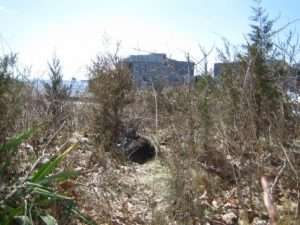The Volokh Conspiracy
Mostly law professors | Sometimes contrarian | Often libertarian | Always independent
New London Gives $6.5 Million in Tax Breaks to Developer Planning to Build Housing on Land Condemned in the Kelo Case
The property has remained empty for almost twenty years, after the Supreme Court's controversial ruling upholding its condemnation to promote "economic development."

Last year, I wrote about how there might finally be some development on the site of the property condemned as a result of the Supreme Court's 2005 ruling in Kelo v. City of New London, the controversial 5-4 decision in which the justices ruled that the condemnation of homes for private "economic development" is permissible under the Takings Clause of the Fifth Amendment, which only allows takings for a "public use." In January 2023, Renaissance City Development Association (the private nonprofit development firm formerly known as the New London Development Corporation, which took ownership of the property after it was seized by eminent domain) sold the condemned land to a developer, which was planning to build new housing on it. Up to that point, the only regular users of the condemned land since the last homeowners were forced out were a colony of feral cats. The supposedly carefully planned development project that justified the condemnations fell through, as also did a number of later proposed uses for the land.

The New London Day, recently reported that the development project is going ahead, but the city has given the developer a hefty $6.5 million tax break to facilitate it:
The City Council late Monday [Sept. 16] approved nearly $6.5 million in tax breaks over 20 years to a developer planning to construct 500 new apartments on two sections of the Fort Trumbull peninsula that have sat vacant for more than two decades.
The fixed tax agreement with RJ Development + Advisors, LLC, approved by a 5-2 vote, would offset about half the $13 million in estimated pre-construction costs needed to meet flood plain requirements and address remaining remediation and other sub-surface issues at the two sites.
In exchange, the city would receive approximately $18 million in tax revenue over the 20-year period of the agreement on parcels that Mayor Michael Passero noted have sat fallow and not producing taxes for a generation.
The vote was preceded by testy exchanges between council members and emotional rhetoric that referenced the peninsula's dark past as a national symbol for eminent domain.
A large swath of the Fort Trumbull area was left undeveloped after a controversial demolition and development push by the former New London Development Corp. That led to the landmark 2005 U.S. Supreme Court eminent domain decision, Kelo v. New London.
Passero, who called that decision a debacle that left the land an "open sore," said the housing project would serve as a salve to "help heal the wound."
Councilors Jefferey Hart and John Satti, who both voted against the tax agreements, echoed concerns raised by several citizens earlier in the meeting, including the prospect of giving a sweetheart deal to a developer who stood to make millions from a project being subsidized on the backs of taxpayers.
"It's important to show resistance to people offering you a bad deal," Hart said. "There's a lot of assumptions that no other developer is willing to take on this project (without a tax break)."
But Felix Reyes, the city's director of planning and economic development said no other viable investor has stepped forward since the property became marketable. Reyes acknowledged the trauma suffered by former residents of the peninsula and the "cruel things done" there as part of the city's effort to attract private development.
"There's no line out the door of developers willing to tackle this project," Reyes said, adding any such firm would face the same pre-construction costs as RJ Development, including a requirement to build the complexes on raised platforms.
Like most property scholars and land-use economists, I am skeptical of the value of targeted tax breaks and subsidies like this one. The better approach to promoting development is to have a good business climate across the board - and respect property rights. Also, projections of the benefits of such taxes and subsidies are often exaggerated. I am skeptical that the City will really get the promised $18 million in tax revenue.
Of course, the projected benefits of "economic development" takings like the one upheld in Kelo are also routinely exaggerated. There are few better examples than the Kelo condemnations themselves. Even if this new development project is a complete success, that would not be a vindication of the original Kelo takings. As I explained in my previous post on this topic:
Since 2005, several efforts to redevelop the condemned land have fallen through. Hopefully, this one will succeed. But even if it does, I don't think it will somehow vindicate the Kelo condemnations. The new development initiative is obviously different from the badly misconceived plan that led to the use of eminent domain over twenty years ago. Moreover, by the time any construction is completed, the land will have lain unused (except by feral cats!) for nearly twenty years. From the standpoint of promoting development, that's an enormous waste.
The region would almost certainly have been better off economically if the original owners had been allowed to keep living there, paying property taxes, and contributing to the local economy. And that doesn't even consider the enormous pain and suffering the original development project inflicted on those who lost their homes (including some who sold them "voluntarily" as a result of harassment and the threat of eminent domain).
I would add that if the City had simply left the property owners alone, they would not have had to give anyone targeted tax breaks to develop the land.
Unless you're one of the feral cats living on the property, it's hard to justify the Kelo takings!
I covered the history of the condemnation process and the harm it inflicted in depth in The Grasping Hand: Kelo v. City of New London and the Limits of Eminent Domain, my book about the Kelo case and its aftermath. In that book, I also explained why the Supreme Court's ruling was wrong from the standpoint of both originalism and living constitutionalism.


Show Comments (20)